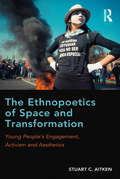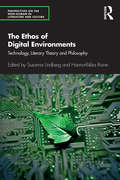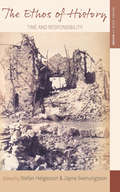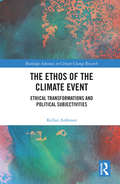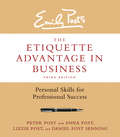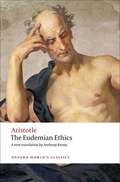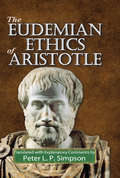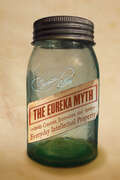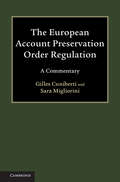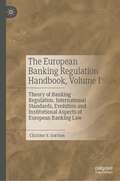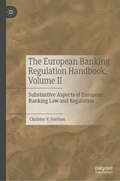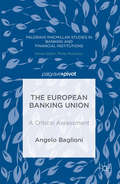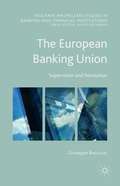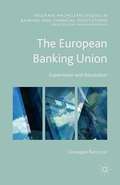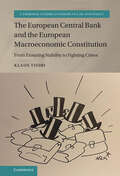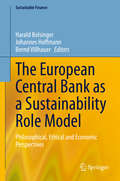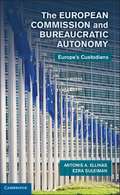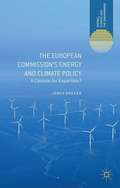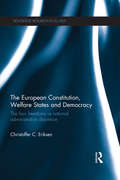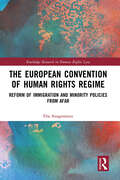- Table View
- List View
The Ethnopoetics of Space and Transformation: Young People’s Engagement, Activism and Aesthetics
by Stuart C. AitkenChange is inevitable, we are told. A job is lost, a couple falls in love, children leave home, an addict joins Narcotics Anonymous, two nations go to war, a family member's health deteriorates, a baby is born, a universal health care bill is voted into law. Life comprises events over which we have considerable, partial, or little or no control. The distance between the event and our daily lives suggests a quirky spatial politics. Our lives move forward depending upon how events play out in concert with our reactions to them. Drawing on nearly three decades of geographic projects that involve ethnographies and interviews with, and stories about, young people in North and South American, Europe and Asia and using the innovative technique of ethnopoetry, Aitken examines key life-changing events to look at the interconnections between space, politics, change and emotions. Analysing the intricate spatial complexities of these events, he explores the emotions that undergird the ways change takes place, and the perplexing spatial politics that almost always accompany transformations. Aitken positions young people as effective agents of change without romanticizing their political involvement as fantasy and unrealistic dreaming. Going further, he suggests that it is the emotional palpability of youth engagement and activism that makes it so potent and productive. Pulling on the spatial theories of de Certeau, Deleuze, Massey, Agamben, Rancière, Zizek and Grosz amongst others, Aitken argues that spaces are transformative to the degree that they open the political and he highlights the complexly interwoven political, economic, social and cultural practices that simultaneously embed and embolden people in places. If we think of spaces as events and events encourage change, then spaces and people become other through complex relations. Taking poetry to be an emotive construction of language, Aitken re-visualizes, contorts and arranges people's words and gestures to
The Ethos of Digital Environments: Technology, Literary Theory and Philosophy (Perspectives on the Non-Human in Literature and Culture)
by Susanna LindbergWhile self-driving cars and autonomous weapon systems have received a great deal of attention in media and research, the general requirements of ethical life in today’s digitalizing reality have not been made sufficiently visible and evaluable. This collection of articles from both distinguished and emerging authors working at the intersections of philosophy, literary theory, media, and technology does not intend to fix new moral rules. Instead, the volume explores the ethos of digital environments, asking how we can orient ourselves in them and inviting us to renewed moral reflection in the face of dilemmas they entail. The authors show how contemporary digital technologies model our perception, narration as well as our conceptions of truth, and investigate the ethical, moral, and juridical consequences of making public and societal infrastructures computational. They argue that we must make the structures of the digital environments visible and learn to care for them.
The Ethos of Europe
by Andrew WilliamsCan the EU become a 'just' institution? Andrew Williams considers this highly charged political and moral question by examining the role of five salient values said to be influential in the governance and law of the Union: peace, the rule of law, respect for human rights, democracy, and liberty. He assesses each of these as elements of an apparent 'institutional ethos' and philosophy of EU law and finds that justice as a governing ideal has failed to be taken seriously in the EU. To remedy this condition, he proposes a new set of principles upon which justice might be brought more to the fore in the Union's governance. By focusing on the realisation of human rights as a core institutional value, Williams argues that the EU can better define its moral limits so as to evolve as a more just project.
The Ethos of History: Time and Responsibility (Making Sense of History #34)
by Jayne Svenungsson Stefan HelgessonAt a time when rapidly evolving technologies, political turmoil, and the tensions inherent in multiculturalism and globalization are reshaping historical consciousness, what is the proper role for historians and their work? By way of an answer, the contributors to this volume offer up an illuminating collective meditation on the idea of ethos and its relevance for historical practice. These intellectually adventurous essays demonstrate how ethos—a term evoking a society’s “fundamental character” as well as an ethical appeal to knowledge and commitment—can serve as a conceptual lodestar for history today, not only as a narrative, but as a form of consciousness and an ethical-political orientation.
The Ethos of History: Time and Responsibility (Making Sense of History #34)
by Stefan Helgesson and Jayne SvenungssonAt a time when rapidly evolving technologies, political turmoil, and the tensions inherent in multiculturalism and globalization are reshaping historical consciousness, what is the proper role for historians and their work? By way of an answer, the contributors to this volume offer up an illuminating collective meditation on the idea of ethos and its relevance for historical practice. These intellectually adventurous essays demonstrate how ethos—a term evoking a society’s “fundamental character” as well as an ethical appeal to knowledge and commitment—can serve as a conceptual lodestar for history today, not only as a narrative, but as a form of consciousness and an ethical-political orientation.
The Ethos of the Climate Event: Ethical Transformations and Political Subjectivities (Routledge Advances in Climate Change Research)
by Kellan AnfinsonThis book develops a politico-ethical response to climate change that accounts for the novelty and uncertainty that it entails. This volume explores the ethical dimensions of climate change and posits that one must view it as a social construction intimately tied to political issues in order to understand and overcome this environmental challenge. To show how this ethos builds upon the need for new forms of responsiveness, Anfinson analyzes it in terms of four features: commitment, worldly sensitivity, political disposition, and practice. Each of these features is developed by putting four thinkers – Kierkegaard, Nietzsche, Schmitt, and Foucault respectively – in conversation with the literature on climate change. In doing so, this book shows how social habits and norms can be transformed through subjective thought and behavior in the context of a global environmental crisis. Presenting a multidisciplinary engagement with the politics, philosophy, and science of climate change, this book will be of great interest to students and scholars of climate change, environmental politics, environmental philosophy and environmental humanities.
The Etiquette Advantage in Business, Third Edition
by Peter Post Anna Post Lizzie Post Daniel Post SenningYour key to professional and personal successCompletely revised and updated, the third edition of the Posts' The Etiquette Advantage in Business is the ultimate guide professionals need to build successful business relationships with confidenceToday, more than ever, good manners mean good business. The Etiquette Advantage in Business offers proven, essential advice, from resolving conflicts with ease and grace to building productive relationships with colleagues at all levels. It also offers up-to-date guidance on important professional skills, including ethics, harassment in the workplace, privacy, networking, email, social media dos and don'ts, and knowing how and when to take responsibility for mistakes.For the first time in business history, four distinct generations inhabit the workplace at the same time, leading to generational differences that can cause significant tensions and relationship problems. The Etiquette Advantage in Business aims to help navigate conflict by applying consideration, respect, and honesty to guide you safely through even the most difficult situations.Written for professionals from diverse backgrounds and fields, The Etiquette Advantage in Business remains the definitive resource for timeless advice on business entertaining and dining etiquette, written communications, appropriate attire for any business occasion, conventions and trade shows, job searches and interviews, gift-giving, overseas travel, and more.In today's hyper-competitive workplace, knowing how to get along can make the difference between getting ahead and getting left behind. The Etiquette Advantage in Business provides critical tools for building solid, productive relationships and will help you meet the challenges of the work world with confidence and poise.
The Eucharist in Medieval Canon Law
by Thomas M. IzbickiThomas Izbicki presents a new examination of the relationship between the adoration of the sacrament and canon law from the twelfth to fifteenth centuries. The medieval Church believed Christ's glorified body was present in the Eucharist, the most central of the seven sacraments, and the Real Presence became explained as transubstantiation by university-trained theologians. Expressions of this belief included the drama of the elevated host and chalice, as well as processions with a host in an elaborate monstrance on the Feast of Corpus Christi. These affirmations of doctrine were governed by canon law, promulgated by popes and councils; and liturgical regulations were enforced by popes, bishops, archdeacons and inquisitors. Drawing on canon law collections and commentaries, synodal enactments, legal manuals and books about ecclesiastical offices, Izbicki presents the first systematic analysis of the Church's teaching about the regulation of the practice of the Eucharist.
The Eudemian Ethics (Oxford World's Classics)
by Aristotle Anthony Kenny"We are looking for the things that enable us to live a noble and happy life. . . and what prospects decent people will have of acquiring any of them. "The Eudemian Ethics is a major treatise on moral philosophy whose central concern is what makes life worth living. Aristotle considers the role of happiness, and what happiness consists of, and he analyses various factors that contribute to it: human agency, the relation between action and virtue,and the concept of virtue itself. Moral and intellectual virtues are classified and considered, and finally the roles of friendship and pleasure. It deals with the same issues as the better-known Nicomachean Ethics, with which it holds three books in common, and its special qualities, as well asthe similarities and differences between the two works, are of fundamental concern to anyone interested in Aristotle's philosophy. This is the first time the Eudemian Ethics has been published in its entirety in any modern language. Anthony Kenny's fine translation is accompanied by a lucid introduction and explanatory notes, which assist the reader in understanding this important work.
The Eudemian Ethics of Aristotle
by Peter L. SimpsonAmong the works on ethics in the Aristotelian corpus, there is no serious dispute among scholars that the Eudemian Ethics is authentic. The Eudemian Ethics is increasingly read and used by scholars as a useful support and confirmation and sometimes contrast to the Nicomachean Ethics. Yet, it remains a largely neglected work in the study of Aristotle's ethics, both among scholars and moral philosophers.Peter L. P. Simpson provides an analytical outline of the entire work together with summaries of each individual section, making the overall structure and detailed argument clear. His translation and explanatory notes include the common books that the Eudemian Ethics shares with the Nicomachean. This translation contains renderings of words and phrases, and proposals for emending the text that differ from what other translators and scholars have adopted.This translation is literal, without expansion or paraphrase, and yet also readable. A readable but literal translation is necessary because in the Eudemian Ethics, more than usual in Aristotle's writings, the logic of the argumentation can turn on the peculiar wording or order. Simpson explains the argumentation where necessary in notes and separate explanatory comments. This book is a fresh, twenty-first-century rendition of the work of one of the most eminent philosophers of all time.
The Eureka Myth: Creators, Innovators, and Everyday Intellectual Property
by Jessica SilbeyAre innovation and creativity helped or hindered by our intellectual property laws? In the two hundred plus years since the Constitution enshrined protections for those who create and innovate, we're still debating the merits of IP laws and whether or not they actually work as intended. Artists, scientists, businesses, and the lawyers who serve them, as well as the Americans who benefit from their creations all still wonder: what facilitates innovation and creativity in our digital age? And what role, if any, do our intellectual property laws play in the growth of innovation and creativity in the United States? Incentivizing the "progress of science and the useful arts" has been the goal of intellectual property law since our constitutional beginnings. The Eureka Myth cuts through the current debates and goes straight to the source: the artists and innovators themselves. Silbey makes sense of the intersections between intellectual property law and creative and innovative activity by centering on the stories told by artists, scientists, their employers, lawyers and managers, describing how and why they create and innovate and whether or how IP law plays a role in their activities. Their employers, business partners, managers, and lawyers also describe their role in facilitating the creative and innovative work. Silbey's connections and distinctions made between the stories and statutes serve to inform present and future innovative and creative communities. Breaking new ground in its examination of the U. S. economy and cultural identity, The Eureka Myth draws out new and surprising conclusions about the sometimes misinterpreted relationships between creativity and intellectual property protections.
The European Account Preservation Order Regulation: A Commentary
by Gilles Cuniberti Sara MiglioriniThe European Account Preservation Order (EAPO) Regulation provides a protective measure for creditors wishing to freeze the bank account of their debtor, preventing the transferral or withdrawal of funds. Courts can issue freezing measures over bank accounts located in other member states, thereby establishing a new remedy for cross-border debt recovery in Europe. <P><P>This book provides a detailed article-by-article commentary of the EAPO Regulation. It describes its legislative history and structure and carries out a critical analysis of its provisions and recitals, focusing on the practical implementation of the instrument. The commentary also provides additional focus on the interplay between the EAPO Regulation and the existing EU instruments and framework, and examines specific issues that the implementation of the Regulation might raise in member states. This is an important resource tool for practitioners, legal scholars and students interested in the theoretical and practical implications of the EAPO Regulation.<P> The unique article-by-article commentary ensures that none of the provisions of the Regulation are neglected and that all interpretative issues are addressed.<P> Incorporates the views and analysis of scholars of numerous member states including Germany, France, Spain and Italy.<P> Offers an in-depth analysis of two crucial issues which were not clearly addressed by the Regulation: its territorial scope and the exclusion of arbitration.
The European Arrest Warrant and EU Citizenship: EU Citizenship in Relation to Foreseeability Problems in the Surrender Procedure
by Joske GraatThis book offers an in-depth analysis of the relationship between EU citizenship, the European arrest warrant (EAW), and the legality principle. It focuses on the role of the EAW in relation to two foreseeability problems with which EU citizens – especially those who exercise free movement rights – could be confronted. These problems concern the foreseeability of specific national criminal laws at the time of the offense on the one hand and forum decisions on the other. The first part of the book addresses the extent to which these foreseeability problems and the role of the EAW therein are viewed as legality problems at the EU level and in three national legal orders (the Netherlands, Germany, and England and Wales).In turn, the second part of the book critically examines the current scope and content of the legality principle in light of the EU’s objective to offer its citizens an Area of Freedom, Security and Justice (AFSJ) in which both safety and free movement are guaranteed. As EU citizens often encounter foreseeability problems when exercising their free movement rights, it is argued that they should be protected by a transnational framework of fundamental rights. The book subsequently makes recommendations for a transnational interpretation of the legality principle, one which fits the normative context of the AFSJ as described in Article 3(2) TEU. On the basis of the evolution of EU citizenship over time, the book also develops two EU citizenship narratives and explains how they could contribute to transnational fundamental rights protection and a solution to foreseeability problems. With regard to arriving at concrete solutions, the book offers recommendations for EU legislation that could adequately remedy foreseeability problems and the role of the EAW therein.
The European Banking Regulation Handbook, Volume I: Theory of Banking Regulation, International Standards, Evolution and Institutional Aspects of European Banking Law
by Christos V. GortsosIn two volumes, this book covers in a comprehensive, internally balanced, systematic and detailed way the field of European Union (EU) banking law and regulation. In three parts, Volume I offers a brief introduction to the role of banks in the contemporary financial system and the theory of banking regulation, a thorough analysis of international financial standards which are contained in the sources of public international banking law (and of public international financial law, in general), a detailed presentation of the gradual evolution and the sources of EU banking law, as well as a precise analysis of the law-making process and the key institutional aspects of this branch of EU economic law. The standards and rules adopted and the institutions created in the aftermath of the (2007-2009) global financial crisis and the subsequent euro area fiscal crisis, as well as during the current pandemic crisis are discussed, as appropriate. A detailed analysis of the substantive aspects of EU banking law will follow in Volume II
The European Banking Regulation Handbook, Volume II: Substantive Aspects of European Banking Law and Regulation
by Christos V. GortsosIn two volumes, this handbook covers in a comprehensive, internally balanced, systematic and detailed way the field of European Union (EU) banking law and regulation. The present Volume II builds on Volume I, which offered a brief introduction to the theory of banking regulation, a thorough analysis of international financial standards, as well as a brief presentation of the gradual evolution and the sources of EU banking law, and a precise analysis of the law-making process and the institutional aspects governing this branch of EU economic law. Volume II contains a detailed analysis of the substantive aspects of EU banking law, starting with the EU rules governing the authorisation, prudential regulation and supervision of credit institutions (Part I), and then moving to those governing crisis prevention and crisis management in the EU banking system, including (but not confined to) the resolution of credit institutions (Part II). Of significant value is the well-established blend between the EU law in force and its interpretation by EU Courts in their numerous judgments.
The European Banking Union
by Angelo BaglioniWhy did European policy-makers introduce the Banking Union? Which are its main features? How does it affect banks and their customers? This book tries to answer these questions, by providing a clear description of the building blocks of the banking union, and by discussing the issues that still remain unanswered.
The European Banking Union: Supervision And Resolution (Palgrave Macmillan Studies in Banking and Financial Institutions)
by Giuseppe BoccuzziThe 2008 financial crisis all but brought down the financial system and real economies of industrial countries. The Banking Union took a broad approach to resolve the structural fragmentation and distortions in the European banking system which were major obstacles to a working single market for financial services. This book examines the numerous changes happening to European legislations for the prevention and management of banking crises. What emerges is a changing picture of regulations and institutions, of goals, tools and opinions, public and private, European and national all involved in the task. The book focuses on the new framework for banking crisis management, starting from the foundations of banking regulation and supervision. It explores the institutional architecture of banking supervision and crisis management, the powers of the authorities, the tools for administrative actions, the complexities of business and bankruptcy laws, individual rights and their legal guarantees.
The European Banking Union: Supervision and Resolution (Palgrave Macmillan Studies in Banking and Financial Institutions)
by Giuseppe BoccuzziThe 2008 financial crisis all but brought down the financial system and real economies of industrial countries. The Banking Union took a broad approach to resolve the structural fragmentation and distortions in the European banking system which were major obstacles to a working single market for financial services. This book examines the numerous changes happening to European legislations for the prevention and management of banking crises. What emerges is a changing picture of regulations and institutions, of goals, tools and opinions, public and private, European and national all involved in the task. The book focuses on the new framework for banking crisis management, starting from the foundations of banking regulation and supervision. It explores the institutional architecture of banking supervision and crisis management, the powers of the authorities, the tools for administrative actions, the complexities of business and bankruptcy laws, individual rights and their legal guarantees.
The European Central Bank and the European Macroeconomic Constitution: From Ensuring Stability to Fighting Crises (Cambridge Studies in European Law and Policy)
by Klaus TuoriThe book is about money, central banking and constitutions. It explains how the European Central Bank was established to ensure stability and prosperity for the euro area. The ECB was guided and controlled by a coherent European Macroeconomic Constitution. However, this model has failed during recurring crises, and the ECB has started to act as the euro area fire brigade. Consequently, it is pushing the boundaries of monetary policy, and with that challenging the accountability mechanisms and fundamentally also the democratic legitimacy of the EMU. The book sheds light on this complex economic-constitutional setting with a view on the future. The imbalance between various new operations and a single price stability objective is difficult to remedy. New objectives of financial stability, economic adjustment and environmental sustainability can cause fundamental ruptures between the ECB's formal role and its actions, and they also dangerously overburden monetary policy moving forward with substantial risks.
The European Central Bank as a Sustainability Role Model: Philosophical, Ethical and Economic Perspectives (Sustainable Finance)
by Harald Bolsinger Johannes Hoffmann Bernd VillhauerThis book examines selected actions and investments of the European Central Bank (ECB) from a climate and sustainability standpoint. Shedding new light on the topic from various angles – ethical, philosophical, political, economical and legal – it situates sustainability mainstreaming in the finance and investment field at all levels. The former ECB President Mario Draghi once said that he considered sustainable development and an intact environment to be human rights, and therefore enshrined in the EU Charter of Fundamental Rights. The acting ECB President Christine Lagarde added that the future path for the climate is uncertain, but it would remain within our power to influence it. However, with all that in mind the ECB’s policy of buying assets as securities is often questionable. This volume analyzes these actions in connection with sustainability, and puts forward practical recommendations for improving the ECB’s investment strategy on its way creating a sustainable financial market.
The European Commission and Bureaucratic Autonomy
by Antonis A. Ellinas Ezra SuleimanThis book examines the struggle of the European Union bureaucracy to maintain its autonomy in an increasingly complex institutional setting and adverse political environment. Using an original survey of nearly two hundred top European Commission officials, it shows that the European Union is a coherent organization that shares a common culture of supranationalism. The European Union's multicephalous structure of political authority limits the capacity of European politicians to curb the autonomy of the Commission but tends to undermine the legitimacy of the organization, which finds itself under persistent political attacks. These attacks inadvertently help the organization bolster its defenses against the external threats and trigger internal legitimation processes that reinforce the devotion of its employees to its institutional mission. The book helps disentangle the complexity of the Commission and makes a contribution to the study of international bureaucracies, a topic that has received little attention.
The European Commission�s Energy and Climate Policy
by Jonas DregerThis book offers a deep insight into the genesis and development of the European Commission's energy and climate legislation, focusing on the interplay of politics and science. How does the Commission react when confronted with knowledge? According to the author, the Commission functions as catalyst transforming knowledge into politics.
The European Company
by Dirk Van Gerven Paul StormThe European company ('SE') is a legal entity offering a European perspective for businesses, which became a reality on 8 October 2004. Its purpose is to allow businesses that wish to extend their activities beyond their home Member State to operate throughout the EU on the basis of a single set of rules and a unified management system. This book explains how to set up and organise a European company, and sets out the text of the relevant EC instruments that serve as its legal basis, as well as the national implementing legislation. It is essential for businesses and their advisers to understand the implementing legislation of the relevant Member States in deciding where to establish an SE. This book provides comprehensive coverage of such legislation in all Member States of the European Economic Area which have, as at 1 July 2005, implemented the Regulation containing the SE statute and the Directive on employee involvement in the SE.
The European Constitution, Welfare States and Democracy: The Four Freedoms vs National Administrative Discretion (Routledge Research in EU Law)
by Christoffer C. EriksenThis book explores how the right to the free movement of goods, persons, services and capital in the European Union legal order affects welfare states. These "four freedoms", as they are known, are vital instruments for the protection of a European market unencumbered by internal frontiers. The European Constitution, Welfare States and Democracy explore the relationships and conflicts that have emerged between the European constitution and the legal regulation of mixed economies and markets within welfare-states. In particular, it examines the threat posed to the discretionary powers enjoyed by national governments and administrative authorities. Christoffer C. Eriksen has undertaken a comprehensive analysis of a series of judgments in which the European Court of Justice has clearly indicated the ways in which the four freedoms may be incompatible with the current practice of entrusting national administrative authorities with discretionary powers and thus highlights how the four freedoms are provoking democratic dilemmas, previously neglected in the academic literature. The book is written in a style which communicates beyond an audience of specialized legal scholars and although it includes analysis of black letter law, its methodology also draws from the disciplines of philosophy, political science, and sociology.
The European Convention of Human Rights Regime: Reform of Immigration and Minority Policies from Afar (Routledge Research in Human Rights Law)
by Dia AnagnostouPrompted by an unprecedented rise of litigation since the 1990s, this book examines how the European Convention of Human Rights (ECHR) system and the Strasbourg Court interact with states and non-governmental actors to influence domestic change. Focusing on European Court of Human Rights litigation and state implementation of judgments related to minority discrimination and asylum/migration, it argues that a fundamental transformation of the Convention system has been under way. Repeat and strategic litigation, shifting methods of supervision and state implementation to remedy systemic violations, and above all the growing engagement of civil society and non-governmental actors, have prompted a distinctive trend of human rights experimentalism. The emergence of experimentalism has profound implications for the legitimacy, effectiveness and further reform of the ECHR system. This study provides an original constitutive account of regional human rights regimes and how they are activated by societal actors to claim rights, advance case law, and pressure for domestic legal and policy change. It will be of interest to international law and international relations scholars, political scientists, specialists on the ECHR, the Strasbourg Court, as well as to scholars interested in the human rights of immigrants and minorities.
